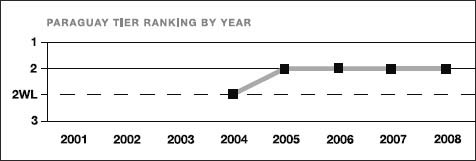Trafficking in Persons Report 2008 - Paraguay
| Publisher | United States Department of State |
| Author | Office to Monitor and Combat Trafficking in Persons |
| Publication Date | 4 June 2008 |
| Cite as | United States Department of State, Trafficking in Persons Report 2008 - Paraguay, 4 June 2008, available at: https://www.refworld.org/docid/484f9a35c.html [accessed 7 June 2023] |
| Disclaimer | This is not a UNHCR publication. UNHCR is not responsible for, nor does it necessarily endorse, its content. Any views expressed are solely those of the author or publisher and do not necessarily reflect those of UNHCR, the United Nations or its Member States. |
PARAGUAY (Tier 2)
Paraguay is principally a source and transit country for women and children trafficked for the purpose of commercial sexual exploitation. Paraguayan victims are trafficked abroad primarily to Argentina, Brazil, Bolivia, Spain, and Italy. Adult and child domestic servitude is a serious problem. Indigenous persons are vulnerable to labor exploitation, particularly in the Chaco region. Poor children are trafficked within the country from rural to urban centers for sexual exploitation and domestic servitude. Street children and working children are common targets for trafficking recruiters. The ILO recently reported that traffickers coerce underage males, known locally as "taxi boys," into transgendered prostitution. Some of these boys are trafficked abroad, particularly to Italy. Trafficking of Paraguayan and Brazilian women and girls, and increasingly boys, for sexual exploitation remains a problem in the Brazil-Paraguay-Argentina tri-border area.
The Government of Paraguay does not fully comply with the minimum standards for the elimination of trafficking; however, it is making significant efforts to do so. During the reporting period, the government improved law enforcement efforts against traffickers and increased victim assistance. However, reported acts of official complicity with trafficking activity are an area for concern.
Recommendations for Paraguay: Intensify efforts to identify, prosecute, and punish trafficking offenders; launch criminal investigations of corrupt public officials who may facilitate trafficking activity; dedicate more resources for victim assistance; and increase efforts to raise public awareness about human trafficking, particularly among youth.
Prosecution
The Paraguayan government improved law enforcement actions against traffickers during the past year. Paraguay prohibits transnational trafficking through provisions of its 1997 Penal Code, but internal trafficking of adults is not specifically prohibited. The 1997 Penal Code prescribes penalties of up to 10 years' imprisonment for trafficking crimes, which are sufficiently stringent and commensurate with penalties prescribed for other grave crimes. A new penal code, which was signed into law in January 2008 and will become effective in 2009, prohibits all forms of human trafficking consistent with the UN TIP Protocol. During the reporting period, Paraguayan authorities opened nine cases against suspected trafficking offenders, and achieved two convictions and sentences of two years of imprisonment for each case. The Attorney General's office in Asuncion has one prosecutor dedicated full time to prosecuting trafficking cases, although prosecutors in other parts of the country investigate trafficking allegations also. The Paraguayan government continued to cooperate with Argentina, Brazil, Spain, and other countries on transnational trafficking cases. Some government officials, including police, border guards, judges, and elected officials, reportedly were involved with and facilitated trafficking crimes. However, no criminal investigations of such suspected corrupt activity have been opened by the government.
Protection
The government improved its efforts to protect victims of trafficking over the reporting period, but overall assistance remained inadequate. The government provides short-term services such as medical, psychological, and legal assistance, in addition to temporary shelter care for adult victims and children. With U.S. assistance, the government in December 2007 opened a new shelter for female trafficking victims; the shelter can accommodate 18 victims. The government funds a small number of anti-trafficking NGOs, but relies on larger NGOs and outside sources to provide additional victim assistance. Paraguayan authorities encourage victims to assist in the investigation and prosecution of their traffickers. There were no reports of victims being jailed, deported, or otherwise penalized for acts committed as a result of their being trafficked. Paraguay does not provide legal alternatives to the removal of foreign victims to countries where they may face hardship or retribution. Paraguay does not have a formal system for proactively identifying trafficking victims among vulnerable populations such as criminal detainees; it relies on Argentine and Brazilian authorities to screen for victims at border crossings.
Prevention
The government conducted trafficking prevention activities during the reporting period, particularly through its interagency anti-trafficking roundtable, which sponsored 12 seminars across the country. The government also works closely with NGOs and international organizations on additional prevention efforts, including in the tri-border area. The government did not, however, make any discernable efforts to reduce consumer demand for commercial sex acts.

